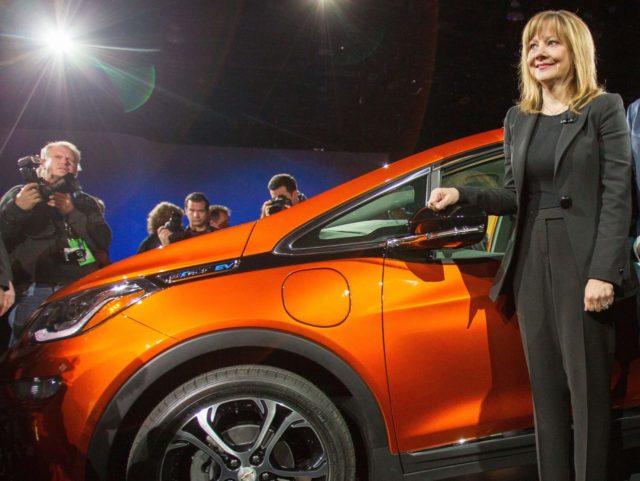General Motors (GM:NYSE) is slashing the rollout of the electric Chevrolet Bolt, despite rave reviews, as America’s largest carmaker foresees Trump radically scaling back federal fuel mileage regulations.
According to Electrek, the Chevrolet Bolt is designed to be a “compliance car” for General Motors to meet state-based sustainability mandates, rather than a mass-market vehicle seeking to maximize sales and market share.
There are ten states in the U.S. that require car makers to sell some supposedly non-polluting “Zero Emissions Vehicle” (ZEV) to do business in the state. They include the populous states of California, New York, and New Jersey, plus seven other smaller states. Together, they account for about 30 percent U.S. vehicle sales.
Car makers can also meet climate change requirements by purchasing expensive credits from Tesla — which, despite huge federal government cash incentives of up to $7,500 per vehicle, has lost $1.7 billion since 2014, and does not look to be profitable in the near future.
Facing the Obama administration’s federal fuel-economy standards of 54.5 miles per gallon by 2025, and expectations that Hillary Clinton would set even larger mandates, ten automakers launched their own all-electric “compliance vehicle” program.
Based on good consumer interest at a $37,495 average selling price for the lightly-equipped model, General Motors expected to go national with Bolt sales in 2016. Despite demand, however, the Electrek blog estimates every Bolt would lose $9,000 without ZEV credits:
There’s no greater proof of a vehicle being a compliance car than being sold at a loss before incentives. Under California ZEV program, GM will receive 4 ZEV credits for every Bolt EV delivered in the state. At a market value of about $4,000 to $5,000 for GM, it means that selling a Bolt in California makes the difference between losing $8,000 to $10,000 per vehicle and making $8,000 to $10,000 per vehicle.
The auto industry has been willing to take financial hits on small-scale production of all-electric cars. But as additional state incentive credits of up to $5,000 per vehicle are used up, the market share of zero-emission vehicles to obtain profitability would have to rise from the current 3 percent of brand sales to 15.4 percent by 2025.
California’s draconian climate change mandate, which orders greenhouse-gas emissions to be slashed to 40 percent below 1990 levels by 2030, would require the market share of ZEVs and hydrogen fuel-cell cars to reach 40 percent to comply with state law.
But since November 8 election of Donald Trump as the next president, GM has quietly slashed the Bolt’s 2016 national roll-out to just California and Oregon. GM now says the Bolt’s introduction will only be expanded to more states in very limited quantities.
By making the future of U.S. auto production and manufacturing jobs the cornerstone of his viral campaign, President-elect Trump won Michigan, Wisconsin, and Ohio. The day after the election, the shares of Japanese automakers crashed. Toyota Motor Corp stock plunged 6.5 percent, Nissan Motor Co Ltd. tanked by 6.0 percent, and Honda Motor Co. shares fell 7.8 percent.
The Alliance of Automobile Manufacturers, which lobbies for U.S. automakers in Washington, has already sent the Trump transition team a request for the President-elect and the Republican-controlled Congress to immediately “harmonize and adjust” down gas mileage rules, because they “pose a substantial challenge to the auto sector due to the steeper compliance requirements for model years 2017-25.”
Given that such a move to lower the federal fuel-economy standards would free U.S. automakers to ramp up domestic production of the type of larger SUVs American customers prefer, GM’s stock price since the Trump’s election has risen over 15 percent.

COMMENTS
Please let us know if you're having issues with commenting.